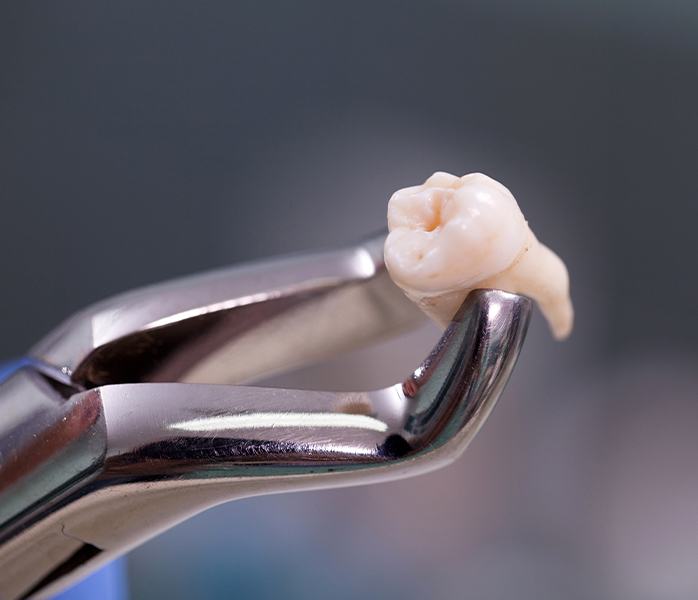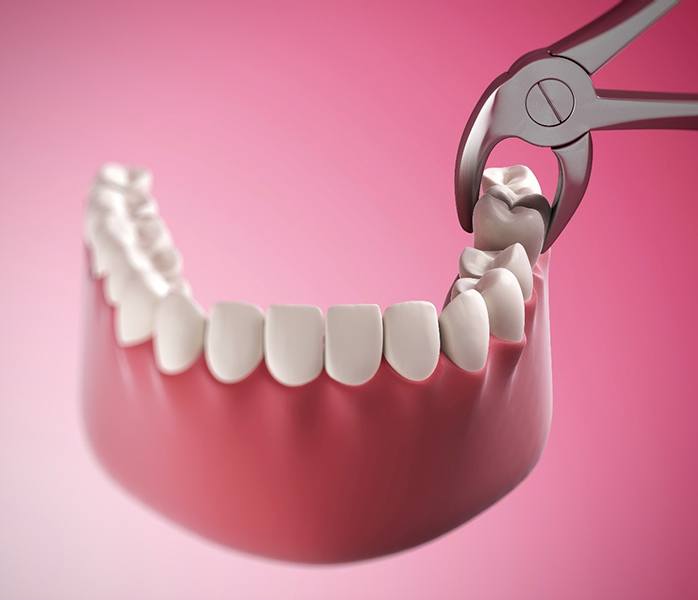


At Transcendent Smiles, our goal is and always will be to save teeth first, not remove them, whenever possible. No dental restoration, no matter how high-quality, can replace the real thing, which is why we always encourage regular preventive care for our patients. However, there are instances where tooth extractions from our Millersville, MD dentist are the only option for protecting your oral health going forward. If this ends up being the case, we’ll always explain why in great detail and go over every step of treatment so you can be prepared.

Tooth removal is always seen as a last resort. However, there are many instances where it’s the best treatment to protect your smile and oral health. For example, if a tooth is severely damaged by decay and cannot be restored with a dental crown, removing it works to stop discomfort and prevent the spread of decay to other neighboring teeth. In other cases, a tooth damaged by injury may be too fractured to save, especially if the damage reached the root. In rarer cases, teeth may need removal to make room for orthodontics.

The way we approach tooth removal depends on the condition your tooth is in. For example, if the tooth is easily visible, we only need to gently rock it back and forth with a dental elevator to remove it from the periodontal ligament holding it in place. Alternatively, teeth underneath gum tissue will require a small incision before removal. The tooth may also need to be broken into smaller pieces and removed that way, rather than all in one piece. Prior to treatment, we always ensure local anesthesia has fully numbed the treatment area and that your comfort needs are met.

Before you leave our practice, we will provide you with specific aftercare instructions to help you remain comfortable and avoid complications while you heal. Everyone’s case is a little bit different, but here are some of the steps that you can expect:

No one wants to get their tooth extracted, but sometimes one is necessary to preserve the health of the rest of your mouth. One concern you might have about your upcoming tooth extraction is the cost. We won’t be able to determine how much your procedure will be until you see us in person. In the meantime, here are some things for you to keep in mind.

Several different factors are used to determine the cost of your tooth extraction. Here are some of the most prominent ones:

The majority of dental insurance plans partially cover the cost of an extracted tooth at 50% after your deductible has been met. However, there could be limits in place or a waiting period before the coverage kicks in. Every plan is unique, so it is best to confirm this with your dental insurance company first so that you don’t run into any surprises. Our team would also be happy to help you with this process.

If you don’t have dental insurance, this doesn’t mean that you are completely out of luck. With our dental membership plan, you can save on treatments completed at our practice. We can also offer an in-house financing plan to split the cost of your treatment into manageable monthly installments. This way, you can get the dental care you need without stressing over finances.

Unless you’ve gone through tooth loss before, getting one extracted can seem mysterious or foreboding, but it doesn’t have to be. Our team can demystify the process, let you know what to expect, and answer any questions you have about the procedure. We want you to feel confident that you’re doing what’s best for your smile and that our team is on your side. Here are some common questions patients undergoing tooth extractions have asked. If you have more you’d like to discuss with us, contact our team and bring the issues up during your consultation.
During the extraction procedure itself, you shouldn’t feel anything. To help you relax, we even offer sedation, so you can be completely at ease while we remove the tooth. After you get home, you may feel some discomfort as the sedation and anesthetic wear off; however, it can be managed with over-the-counter pain reliever. You can also put a cold compress on your face to reduce swelling and mild pain. If you continue to feel pain after a week or the pain becomes progressively worse, you need to contact our office because you could have an infection.
As soon as you get home from your tooth extraction, you’ll need to rest for a day or two and avoid strenuous activities for several days. Keep clean gauze on the site by switching it as needed. It’s essential that you allow a blood clot to form on the site because it protects the sensitive tissue underneath. If the clot becomes displaced, you could experience a painful infection called dry socket. As a result, it is a good idea for you to avoid using a straw or smoking for at least 48 hours following extraction. Soft foods are recommended for several days afterward as well.
Although there are certain exceptions (e.g., a tooth is removed for orthodontic purposes), most of the time, when a tooth is extracted, it should be replaced. Not only does a hole in your smile alter your appearance and confidence, but it can also lead to other unpleasant outcomes. For instance, your remaining teeth can shift out of alignment, which can impact your ability to bite and chew your food. Your teeth can wear down prematurely, potentially resulting in additional tooth loss. If you have a tooth removed, you should seriously consider having it replaced to preserve the rest of your smile.
Your viable options for tooth replacement will greatly depend on your situation. For a single missing tooth, you may choose between a dental implant or bridge. Multiple missing teeth can be replaced with various solutions based on the location and number of teeth and other factors. When you’ve had sufficient time to heal, we can then talk about your replacement options, the advantages of each, and which one would best suite your smile.